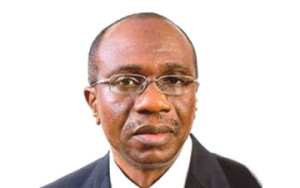
Nigeria’s central bank disappointed financial markets by ignoring calls to devalue the currency, while keeping its benchmark interest unchanged to help support an economy hit by plummeting oil prices.
The Monetary Policy Committee held the policy rate at 11 percent after lowering it from a record 13 percent in November, Governor Godwin Emefiele told reporters on Tuesday in Abuja, the capital. That was in line with the forecasts of 23 of 24 economists surveyed by Bloomberg.
Emefiele, 54, has come under pressure to devalue the naira and ease foreign-currency controls that are hurting businesses and worsening the outlook for growth in Africa’s biggest oil producer. He has favored lowering interest rates instead to ease liquidity in the economy.
“The current episode of lower oil prices is expected to remain over a very long period,” the governor said. “Consequently, it is imperative to brace up for a longer period of low government revenues from oil sources which will necessitate hard and uncomfortable choices.”
The central bank has effectively fixed the naira at 197 to 199 per dollar since March. The currency was trading at about 300 on the black market on Tuesday.
“They’re living in denial,” Tosin Osunkoya, head of trading at Rand Merchant Bank Nigeria Ltd., said in an interview on CNBC Africa, predicting the currency will weaken to 315 to 320 per dollar on the parallel market. “Something has to give. People were expecting some measure of devaluation.”
Inflation, which accelerated to a three-year high of 9.6 percent in December and has been above the central bank’s target of 6 percent to 9 percent since May 2015.
President Muhammadu Buhari, who took office last year, has backed the central bank’s restrictive foreign-currency policy.
“I doubt if the central bank has the political capital to devalue,” Lanre Buluro, head of research at Primera Africa Securities Ltd., said by phone from Lagos. “By the decision not to devalue, the gap between the official and black-market exchange rate will continue to widen. People who have legitimate demand for dollars will not be getting it.”
END

Be the first to comment